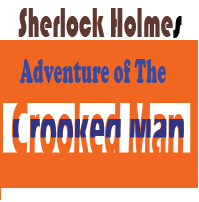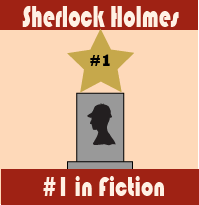Jeremy Brett as Sherlock Holmes
Widely recognized as the best Sherlock Holmes actor, Jeremy Brett's performance in the Granada Television series provides an unparalled opportunity for classical scholars to analyze the role of film in literature.
AND watch a great Sherlock show.
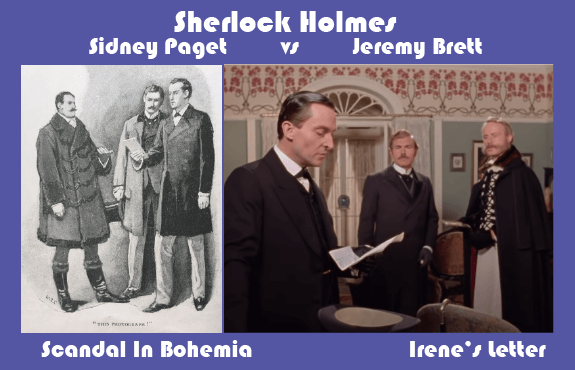
The Granada Series
From 1984 to 1994 a total of 41 Sherlock Holmes episodes were filmed by Granada. Though more than a hundred different actors had filmed the part, and many hundreds more have played him on stage, this series stands alone. Among the many features that make it shine:- The determination of the original director, Michael Cox, to remain true to the original Conan Doyle stories
- A full color series after decades of black and white films
- A full set built for 221b Baker Street that reflected the details drawn carefully from the stories
- Authentic Victorian sets, clothes, streets... everything
- Old, beautiful English estates for different scenes
- Gorgeous horses! The clip-clop of hooves on old cobblestone roads is a marvelous touch.
- But of every detail they did right, nothing was as significant as Michael Cox's choice to ask Jeremy Brett to star as their Sherlock.
Instant Success
On April 24, 1984 the first episode was shown on British television and made an instant splash. In the interview linked to above, David Stuart Davies described that splash:There’s that brilliant opening scene where Watson comes into the room and he’s talking to Holmes. You do not see Sherlock’s face you just see the back of his head and then slowly Jeremy turns his head round and you gradually see him. And you think “Crikey! That’s Sherlock Holmes! That is Sidney Paget’s drawing brought to life!"
For the serious Sherlock scholars, this series was a gift like no other. But it wasn't just the Sherlockians who liked it. Overnight Jeremy Brett became a household name and a new generation of Sherlock fans was born.
Watching the Granada Series
Other series and Sherlock movies have since been made, but none have achieved what Jeremy, Michael, and their many associates achieved.In addition to giving every Sherlock enthuasiast the best interpretation of the original stories ever done, this series gives every literary analyst - young or old - an unprecedented ability to evaluate the role of film in literature.
This series presents this opportunity because:
- These short stories are quick to read.
- Classic literature is classically interpreted.
- Committment to the original produced attention to detail.
- Necessary modifications are required to turn a written story into a film.
How to Watch and Critique
Here is a simple formula guaranteed to make a knowledgeable critic out of almost every viewer:- Read the real story. (Come on, its only ten pages. Don't be lazy. Actually read it first.)
- Watch the film.
- Re-read the story. Remember, it's short. It will be eye-opening. Really.
- Find the details and dialogue that were repeated exactly.
- Note the differences. Why do you think they made those changes? Do you agree with their change?
Digging Deeper
For those of you who want to dig deeper with outside material, here are a few sources that can give you a critique of the individual Granada performances. But DO do yourself a favor and perform the read-watch-read-assessment first.- ArthurConanDoyle.com has a listing and analysis of each of the episodes as well as a list of all actors and the order/dates the shows were shown.
https://www.arthur-conan-doyle.com/index.php/Sherlock_Holmes_(TV_series_1984-1994)
- Bending the Willow by David Stuart Davies - In addition to an analysis, David gives behind-the-scenes information on each story as well as Jeremy and the entire series. He was present for the filming of much of the series and discussed details with the actors.
- Jeremy Brett: Acting A Part by Maureen Whitaker, foreward by David Burke
A recent account with information on every show Jeremy did, including those in the years before and after he became Sherlock Holmes.
What Jeremy Gave to Sherlock Holmes
A Shining Star
What made Jeremy's interpretation out-shine every other actor's? In addition to portraying the original stories AND being as faithful as he could to Doyle's details, Jeremy captured something no one else ever had:The meaning of the story.
Since Doyle's first narrative was published, virtually everyone had heard of Sherlock Holmes. Even the illiterate recognized his silouette and knew about this genius and his side-kick Watson who watched him solve the most baffling crimes.
But those who read more than one Sherlock story knew there was more to it than that. The series Doyle wrote is the legend of how one man through friendship discovers the caring, warm-beating heart of his silent, cold, aloof partner.
Jeremy was determined to show that.
It wasn't about a detective hat, a magnifying glass, a second floor apartment and a very observant man. Though those were part of it.
A Brilliant But Difficult Performance
Jeremy said Sherlock was the hardest role he ever played. Considering he was a classically trained actor with thirty years in film and theater, particularly specializing in Shakespeare plays, that assessment is hard to digest. How could the relatively modern Sherlock be more difficult than Hamlet, Macbeth, or any other Shakespeare play with its old English prose?It was one thing for Doyle to write about the dual-nature of the detached detective; it was another thing to have to portray it. "A crack in the marble," Jeremy called it.
David Stuart Davies explains further:
...he must come across as an interesting character you can feel attracted to. At the same time he has to remain this cold person. “Give me work, I’m just a mere brain,” he says at one point. Those complex elements within the character have to merge into a performance which remains true to the original but also is attractive to the viewing public. Because in the end Jeremy is an actor and he had to give a performance.
The Dark Side of the Moon
Jeremy referred to Sherlock as a damaged penguin, a moody character who was like the "dark side of the moon." He also referred to his performance as "dancing in the moonlight."Holmes has become the dark side of the moon for me. He is moody and solitary and underneath I am really sociable and gregarious. It has all become too dangerous.
Jeremy was universally acclaimed by those who worked with him as a cheerful and caring person - not just by his directors and fellow actors but by stage hands, cleaning staff, and waitresses. And the fans who lined up for his autograph.Comparisons Between Sherlock and Jeremy
While Jeremy easily recognized the differences between his amiable personality and the standoffish character who made him famous, there were some notable parallels between them. It may be that some of the similarities allowed the easy-going Jeremy to make such a believable and likable Holmes.Similarities
Both were British gentleman: Sherlock the son of a country squire and Jeremy the son of a rural landowner.Indeed Jeremy was of an age where he COULD have been the grandson of either the fictitious Sherlock or the very real Arthur Conan Doyle. Jeremy attended the prestigious Eton as did Conan Doyle's son. Both Jeremy and his fictitious character were athletic at school.
After college, both permanently gave up the fresh country air of their forefathers to settle amongst the crowds of London - admittedly for very different reasons.
Both were well-versed in Shakespeare, Jeremy as a recognized Shakespearean actor and Sherlock who frequently quotes the old bard. Indeed some have speculated that Sherlock himself had been a Shakespeare actor based on his frequent quotations and his expertise at disguise. Jeremy once said that Sherlock wouldn't have crossed the street to meet him since he was only an actor. Perhaps Jeremy was wrong here: Holmes might have crossed the Baker Street set - either to give some acting tips or obtain some.
They both were lovers of classical music, opera, and theatre. Both were musicians: Sherlock an accomplished violinist and Jeremy reported to be a pianist. Jeremy was also a vocalist. He stated he would break into song at all hours of the day and occasionally entertained fellow diners to improptu concerts; something no one could ever imagine our more-reserved Sherlock doing.
Both were apparently well-rounded men with multiple talents and accomplishments. Jeremy was an archer, horseback rider, animal enthusiast, as well as displaying talent in the kitchen and on the dance floor. Sherlock exhibited a different set of hobbies which included chemistry, boxing, sword fighting, writing, and martial arts. Both were lively conversationalists. (If Sherlock WAS real and you COULD get them to cross the street to talk to each other, it undoubtedly would have been a most animated conversation.)
They shared a similar vice since they were both inseparable from their cigarettes. Sherlock was famous for his pipes; Jeremy won pipe-smoker of the year in 1989. He then donated the prize money to a run to raise money for cancer research done by Linda Pritchard, an acquaintance who later became his partner.
Contrasts
There were, of course, conspicuous differences besides their basic personality types. Jeremy shunned street drugs and even led his fictitious sleuth to do so - after getting permission from Arthur Conan Doyle's daughter to deviate from the script as an example to the younger generation on this particular detail.Sherlock was famous for avoiding women; a discomfort the twice-married Jeremy did not share.
And while Sherlock had described himself as having "a limited sense of humor," no such depiction would ever be applied to the jovial actor who impersonated him.
Note These Features
We mentioned above that a viewer should read the original Doyle story before and after watching the Granada episodes to fully appreciate the authentic detail that was captured.Book of Details
In the two years between the time Jeremy accepted the role and the cameras started rolling, time was well-used. He and others read and reread the canon. They made a book that listed all the details about the two men, the objects in their apartment, and their habits.As you read the stories, you will note that each story is about 9/10 detective story, and 1/10 the saga of Sherlock/Watson. By creating this book that catalogued that sprinkling of the ten percent, Granada embedded the series with faithful background information. The Persian slipper, as a single example, was only described in The Musgrave Ritual but it is visible in any episode with the Baker Street fireplace.
Opening Drama
A wonderful feature of the Granada films is their opening scenes. They give a glimpse into the events that will form Holmes' next case. Knowledgeable Sherlockians know what is happening, but the uninitiated have to stay tuned. These pre-episodes whet the appetite without giving away the plot and generally support the original story while increasing its dramatic value.It's a fantastic addition.
Baker Street Commencement
After the Opening Drama the Title Sequence with theme song and credits is played. Next is another favorite feature: the Baker Street Scene.Here the screen play writers had some work cut out for them. In the written text, the Baker Street Scenes are only one type of three openings to a Sherlock story. While the Baker Street Scenes were Doyle's most active openings, he frequently started with a less engaging reminiscence written by Watson.
Not so with film. Jeremy has to jump in or slump in - or fret, fume, or fuss. He does. All while remaining true to Watson's nostalgic contemplations in the book.
Emotion
Brett's performance soars when it comes to expressing the emotion of the detective famed for being unemotional. Here, again, he draws from the actual text.Seldom did Doyle write a story where Sherlock didn't chuckle, laugh, or smirk. Jeremy presented the camera with a plethora of laughs, smiles, snorts, grimmaces, and grunts. And he had his nasty "disputatious" moods too. No previous actor had dared this.
Brett broke the ice and others later followed.
True to Paget
Here is a feature over-and-above their fidelity to Doyle: they also remained true to Sidney Paget's original drawings. Paget attempted to be faithful to the text, but he had to add his own details. Jeremy and friends kept that detail as often as they could. If you happen to get one of the few Sherlock Holmes editions with the original drawings, you will have an additional item for your scavenger hunt.
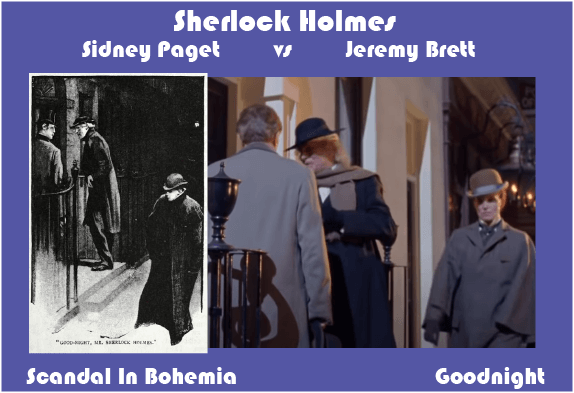
Direct Quotes
Of course additional dialogue was written for the show, but as much as possible they relied on direct quotes drawn from the text. The observant viewer will note one thing: some of Holme's lines in the text are given to Watson in the film. This was needed to give Watson a more active role. As the narrator of the written version, he didn't need to say much. Watson merely wrote what he thought and observed. But with viewers and not readers watching Sherlock, it left Watson with nothing to do. Watch how they fill in the gap while remaining true to the text.
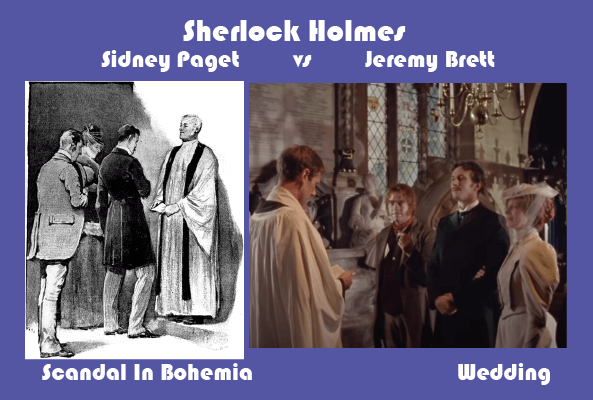
Jeremy: A Style of His Own
Look For What He Added
Jeremy is often referred to as the "definitive Sherlock Holmes" which is not exactly true. The best, the most authentic, the quentessential Holmes - yes. But it is Doyle - and not Brett - who defines Sherlock Holmes.This is another reason for reading the text before watching the films. Jeremy's Sherlock is NOT one-and-the-same as the literary Sherlock.
Attractive and Attracting
For one thing, Jeremy had spent three decades as the leading male actor in many romantic roles. He wasn't about to give up his provocative talents even if he was playing Sherlock Holmes. The discerning viewer will note how the actor's behavior around women differs just-so-slightly from the written character in a way that is intentionally alluring. Hovering, lingering, touching his clients; he helps them out of carriages, holds their hand to indicate where they should sit, drifts frequently towards them. Is he savoring her perfume?The literary Holmes wouldn't have done that. He would have blushed.
His View of An Actor
Jeremy reported that his mentor, Laurence Olivier, taught him that an actor needed, "The voice of a full orchestra and the body of a god." A bit melodramatic, perhaps. But Jeremy worked on both.Sherlock, on the other hand, had a commanding presence he employed as needed. Most of the time he didn't need it and stayed low-key. Lying low was not one of Jeremy's traits.
Dynamic Diction
In his younger years, Jeremy had oral surgery since he was unable to prounounce R's and S's correctly. He spent the rest of his life practicing diction daily with a result that almost surpassed that of Olivier's proverbial full orchestra. He trilled his R's and spit out one-line zingers that would have left the original Holmes breathless.Readers will note that the Holmes-of-Doyle had a dry, subtle humor. Holmes-a-la-Brett flared and flashed as he fired off the statements memorized from the text.
Two Hands and Two Feet
It wasn't just his articulation that increased the drama. Jeremy gestures and points in a style all of his own. Some of those gestures, in fact, can be seen in some of his earlier non-Sherlockian films for it is Brett and not Holmes who flounces across the room.Indeed, our Victorian-era-Sherlock would not have flapped his coat-tails before sitting down or sat cross-legged in yoga position. Jumping over furniture, leaping downstairs, diving onto the ground, hopping out of moving carriages, and flinging his leg over a horse are just some of his signature movements.
Jeremy capered across the screen just as a painter scrawls his signature on a canvas.
Rudeness and Anger
In addition to laughter, kindness, and fondness for his few friends, Jeremy also demonstrated a grumpier side to Holmes. He frequently displays a far greater irritation than his literary predecessor.Note particularly how he treats Mrs. Hudson. In the books Holmes addresses her formally. Brett yells at her, scolds her, kicks her out of his flat. All the while the resilient Mrs. Hudson (played by Rosalie Williams, a personal friend of Jeremy's) smirks unintimidated by his ire.
Holme's clients also get unnecessarily accosted by their host. He rolls his eyes at them or abruptly holds the door open to indicate their time with him is up.
While it is true that Sherlock Holmes was somewhat of a reserved and isolated character, Brett's moody interpretation significantly increased his darker side.
Personal Tragedy
The first two seasons produced thirteen shows with a lean, agile Jeremy. But with each passing season an older, heavier Holmes appeared on the screen. It is to Jeremy's credit that - in spite of a cruel and unethical exposure by a cruel and unethical press - he bravely discussed his personal problems and used the opportunity to encourage others to seek help if they encountered the same. Indeed the story of this series and the story of his pain are inseparably entwined.Loss and Grief
Jeremy described how he had remained expectant of his wife's survival from pancreatic cancer up until the moment of her death in 1986. That very night he performed on stage as scheduled - likely in a state of stunned shock. He returned to Manchester for the filming of the next Sherlock Holmes series without a break in his work schedule. Not surprisingly, he eventually collapsed under the strain and was admitted to a psychiatric hospital."The lights went out," he described when talking about the effects of his wife's death. It was probably a brief psychotic break produced by grief. He was diagnosed with manic depression; now labeled as bipolar disorder.
"The stiff upper lip isn't always best," he said later. One wishes he had had someone to give him his own advice when he needed it - or would have listened to them if they had. Indeed Jeremy's unrelenting schedule intended to divert him from his pain mimics Sherlock's advice to his bereaved friend: "Work is the best antidote to sorrow, my dear Watson."
Bipolar
It is probable the young Jeremy who broke into song at restaurants and stayed up all night dancing had Bipolar Type II, a less severe form of the illness. Then after his hospitalization for psychosis the more severe Bipolar I took effect. He was 53 at the time, definitely a late age for a bipolar diagnosis. Episodes of severe depression and manic highs became monstrous challenges that faced him as he continued to film the series.Illness
Toxic doses of lithium were needed to control his mood swings with significant cost to his physical health. Weight gain was duly noted by the critics. Congestive heart failure developed causing him to collapse several times while filming. In the last episodes one can hear the fluid in his lungs. Unable to continue, he resigned his contract with Granada in 1994.Graciously, Jeremy forgave the Sun reporters who broadcast his breakdown despite the distress their sensational headlines caused him and his family. He found the public was empathetic and "took me to their hearts." With deteriorating health and inability to get professional insurance, the doors of his career closed behind him.
A few weeks before his death his last TV appearance was filmed - but not as an actor. Speaking as himself, he described his battle with manic depression and encouraged others to seek help from medical professionals and support groups. He died at home of heart failure in September 1995.
An Unended Story
The Granada series was never finished. Forty-one episodes were filmed, and two further episodes were combined into two of the filmed stories. That left 17 of Arthur Conan Doyle's original tales uninterpreted by the master of Sherlockian interpretation.David Stuart Davies has noted that some of the remaining stories are a little weak for filming a one-hour show. But within the 17 there were still some meaty-plots that might have been filmed: The Engineer's Thumb, The Adventure of Black Peter. And who wouldn't have loved to see Brett's vise-like grip on the neck of Von Bork on the eve of World War I?
Twenty-five years have passed since Jeremy Brett's death and the list of Sherlock actors continues to grow. But none have come even close to portraying the Holmes with such authenticity.
Even sadder, is the fact that Jeremy earned no thanks and no recognition in his lifetime for his accomplishment. Like the original stories, the Granada series was translated into dozens of languages and seen around the world. And while he is widely acclaimed as the best Sherlock Holmes, no official awards would ever be given to him.
Of the list of top ten Sherlock Holmes actors, five or six have been officially knighted in England for their "artistic contributions." But the actor who did the most episodes, the original stories, the authentic character? Silence. The silence is even more deafening considering he was as British as one can get: a Shakespearean actor, a BBC actor for their plays of the month, and finally the modern face of England's most famous character to the rest of the world.
Recognition is particulary important to an actor: perhaps another contrast between Sherlock who didn't seek recognition and Jeremy who didn't receive it.
Or maybe he did.
In recent years the viewing public has shown less interest in such official awards, sometimes deemed an inner circle patting themselves on the back and admitting their own favorites into their club. In spite of the awards they so highly value, most of their movies can be purchased for a few dollars several years after they are released. Not so with Jeremy Brett's performance of Sherlock. Expect to pay full price on Amazon and Ebay. Even used copies bring top dollars. While the episodes can be watched for free on Youtube, people continue to buy the latest Blu Ray for the higher quality. It's worth the price. (Make sure you buy the correct version for your country - by the way.)
And even after death we can find more similarities between Jeremy and Sherlock. Born into wealth, they earned notoriety by their own skill. They struggled through depression and succeeded. They appealed to the common people: Sherlock in the back alleyways of London and Jeremy on its public buses after fame and misfortune made him known to everyone.
And they both had a large following. Jeremy gave them a vivid performance of their favorite character as well as a little bit of himself. The public embraced Sherlock Holmes not inspite of his faults but largely because of them. They took Jeremy "to their heart" perhaps not as much because they knew he had suffered, but because they felt he was one of them.
Analysis of Film and Literature
In uncovering the background story of the stories, we see that film alters the public's perception of a character. In certain characters, such as Robin Hood or King Arthur who lack original written sources, the movie industry has almost recreated the person depicted.Sherlock Holmes is different. For one thing, we have the initial stories and know their original author. Even the original authorship of Shakespeare's plays are debated. No one questions if ACD wrote SH. No one even wonders what those abbreviations stand for.
Nonetheless, film continues to interpret and reinterpret him. But the availability of Doyle's stories gives the upper hand to the public, not the directors and producers. They are free to invent and create but they use their creativity at their own risk. Doyle set the standard by which the public could evaluate them. With much thanks to Michael Cox and Jeremy Brett, a relatively low budget TV series continues to earn the highest grade.
And you just have to love those horses!
Sources
Davies, David Stuart - Bending the Willow: Jeremy Brett as Sherlock Holmes (1996, first edition; Revised 2010)Davies, David Stuart - September 2020 Interview
Jameson, Derek - "Jeremy Brett Interview" broadcast July 1989 - available on Youtube
Manic Depression Awareness - September 1995 - available on Youtube
Pritchard, Linda - On the Wings of Paradise: The Jeremy Brett-Linda Pritchard Love Story (1998)
Whitaker, Maureen - Jeremy Brett: Playing A Part (2020)
Buy Sherlock Holmes: The Unit Study
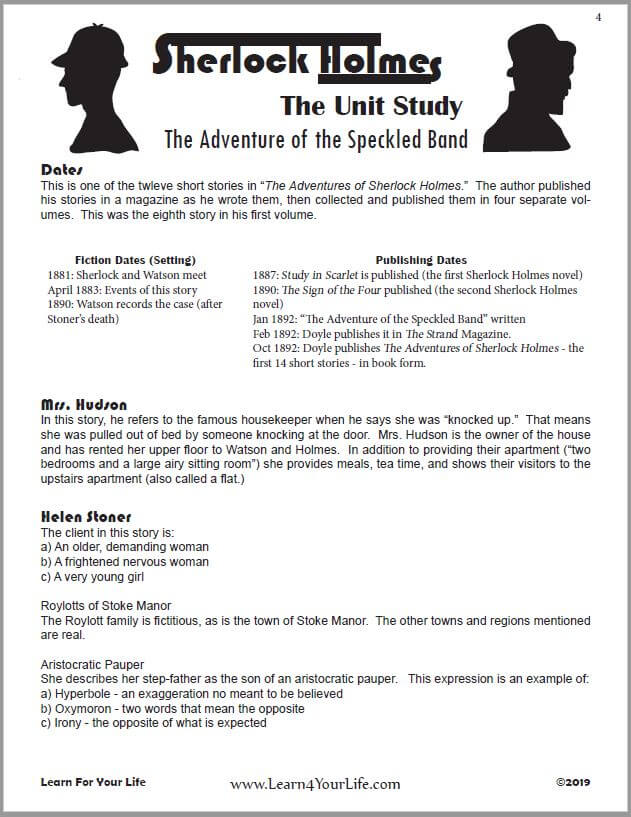

Student Guide AND Teacher's Answer Key Included
$2.99 Download - 183 pages
Eight of the most popular tales demonstrate how to investigate a detective story.
![]()
Sherlock Holmes Pages
A catalog of our pages on Sherlock Holmes.


About Our Site
Hands-On Learning







